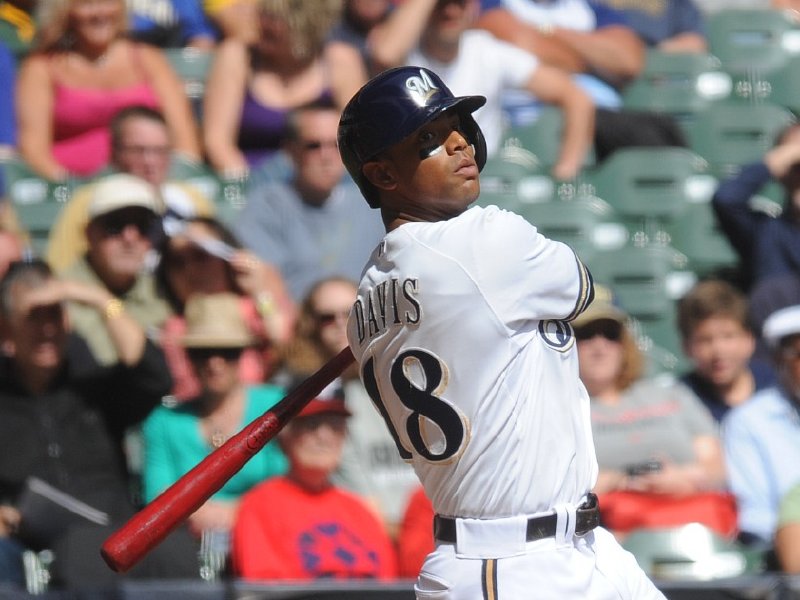Over a month’s time, Khris Davis looked lost.
The 25-year-old outfielder made the Milwaukee Brewers Opening Day roster, but with Ryan Braun, Carlos Gomez and Norichika Aoki set as starters, his role would be off the bench. He was quiet, often keeping to himself in the clubhouse. He was quiet on the field, too, struggling with the limited – but important – responsibility put on his shoulders.
In that first month of the season, he made 18 plate appearances in 14 games. He received more than one at-bat twice, April 5-6 against Arizona. He hit .188, collecting three hits.
Brewers manager Ron Roenicke admitted he put Davis in a difficult spot, but that only went so far.
"It’s a lot of pressure to put on a young guy in this job, but he needs to produce," Roenicke said in April. "If you’re a bench guy that is outstanding defensively then you can take some of the offensive parts. Yuni (Betancourt) can play them all. He’s very valuable. He plays first now, he plays (first, second and third), and he can play the outfield, so Yuni doesn’t have to hit as well as somebody else, (like) Khris Davis, who just plays left."
After being hit by a pitch against Pittsburgh on May 1, Davis was sent down to Class AAA Nashville.
"It was difficult," Davis said about his first stint in Milwaukee. "I struggled when I went down too, a little bit. But at the end of the day, this game is hard, no matter what level it is. So, you can’t be too hard on yourself. You’ve got to have that short term memory to flush anything bad that happens because it’s easy to get that steam rolling and it just carries over and you can’t stop."
Davis made a quick, one-game appearance with the team in Arizona on July 12, but was recalled for good on July 23. His first six appearances were again off the bench, but he was far more successful, hitting .600 with four RBI and two home runs.
"The first time around I went down in the minor leagues and I knew how to prepare, or I learned how to prepare what it takes to be successful up here," he said. "So I just started working and doing a lot of preparation stuff within my routine, just working out, and stuff like that, and just being ready."
That production earned him a spot in the everyday lineup, beginning with the back end of a double-header with the Chicago Cubs on July 30. Though he would end up missing some time as he battled a wrist injury, Davis finished the year hitting .281 with nine home runs and 23 RBI over his final 35 games – a stretch where the Brewers went 20-15. He slugged .588 and had an OPS of .939.
Perhaps coincidentally, Davis was much looser. He smiled more, joked around with his teammates. He signed on to Twitter. Granted, many of his Nashville teammates wound up joining him in Milwaukee as injuries took their toll, but there was another reason why Davis seemed to find his groove: see ball, hit ball.
"My dad (Los Angeles Dodgers scout Rodney Davis) used to tell me, see a good pitch and put a good swing on it," he said. "There’s nothing more simple than that. I can get caught up in asking myself questions, asking what this pitcher is going to do to me instead of making it simple and just see a good pitch and put a good swing on it."
While he could always call his father for advice, Davis often looks inward, at his own thoughts and feelings. He journals daily about his personal life and baseball, and always goes back to re-read what he thought about certain situations.
"You never know when you’re going to be here again and you just want to take so much from it and really be in the moment," he said. "I’ve done it my whole life, just journaling, just writing down my thoughts throughout the day just to stay inside the day. It’s easy to say ‘Oh, I’ve got two more weeks left and I’ve got to do this.’ So it just makes it be where you are now.
"It’s just basically freestyle."
The journal he wrote in during the 2013 campaign had a black cover, which was covered in hand-drawn pictures in silver marker.
"I like draw little pictures and stuff. There’s some personal shit in there," he said flipping through the pages. "It helps me remember what it feels like to be locked in or when you’re in a special zone."
He tossed it back in his locker, but be sure he’ll look at it again this offseason following his first season in the major leagues. The Brewers once again are set in the outfield with Braun, Gomez and Aoki (general manager Doug Melvin said the team would pick up the right-fielders team option), but the Brewers did like the power and consistency at the plate he showed down the stretch.
"I believe Khris Davis can knock in 85-90 runs a year if given 500-some at-bats," Melvin said. "If we need to add offense – I think we were 130 or 140 runs less this year – Khris Davis can be a part of helping that offense. He’s had some injuries, too, so he needs to stay healthy. In his minor-league career, he’s had some injuries. Just keeping the outfield depth is important. It’s not an area we have to go out and look for someone. I do believe the pieces are there to give us a productive outfield."
Melvin allowed that there were some internal discussions about moving Braun to right field to accommodate a full-time promotion for Davis, but the softspoken outfielder is prepared for any role.
"Yeah, absolutely, because I’ve seen a lot of these pitchers now," he said. "I’ve seen a lot of these teams. I’m in there. I’m really here right now. Whatever happens in the future as far as a bench role, I just know there’s going to be more comfort. I’m going to figure them out and they’re going to figure me out so it’s just a matter of just playing."
Despite knowing that the organization was impressed with his performance, and that there were internal discussions about perhaps moving Braun to right field to accommodate his bat, Davis knows he hasn’t solidified himself as a major league hitter.
"I don’t think I’ve proven that yet," he admitted. "All I can do is just come up with a plan and just prepare as much as I can (this offseason). The goals are still the same, to be an All-Star every year. I want to play in an All-Star game. Shoot, the preparation I’m pretty good at so I’m not concerned about it. Nothing changes. I’m not going to try and reinvent something. I’m just going to do what works for me."
Jim Owczarski is an award-winning sports journalist and comes to Milwaukee by way of the Chicago Sun-Times Media Network.
A three-year Wisconsin resident who has considered Milwaukee a second home for the better part of seven years, he brings to the market experience covering nearly all major and college sports.
To this point in his career, he has been awarded six national Associated Press Sports Editors awards for investigative reporting, feature writing, breaking news and projects. He is also a four-time nominee for the prestigious Peter J. Lisagor Awards for Exemplary Journalism, presented by the Chicago Headline Club, and is a two-time winner for Best Sports Story. He has also won numerous other Illinois Press Association, Illinois Associated Press and Northern Illinois Newspaper Association awards.
Jim's career started in earnest as a North Central College (Naperville, Ill.) senior in 2002 when he received a Richter Fellowship to cover the Chicago White Sox in spring training. He was hired by the Naperville Sun in 2003 and moved on to the Aurora Beacon News in 2007 before joining OnMilwaukee.com.
In that time, he has covered the events, news and personalities that make up the PGA Tour, LPGA Tour, Major League Baseball, the National Football League, the National Hockey League, NCAA football, baseball and men's and women's basketball as well as boxing, mixed martial arts and various U.S. Olympic teams.
Golf aficionados who venture into Illinois have also read Jim in GOLF Chicago Magazine as well as the Chicago District Golfer and Illinois Golfer magazines.







